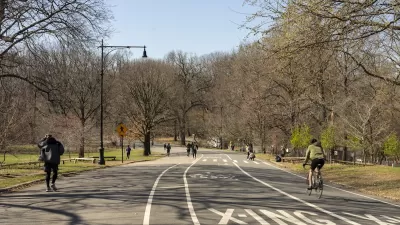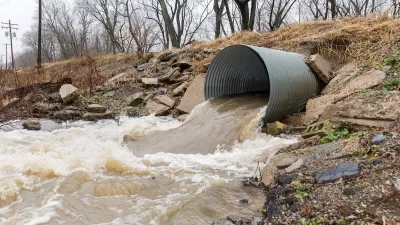Creating adaptive, sustainable communities may require rethinking some planning basics.

Stephanie Sklar, CEO of the Sonoran Institute, and George McCarthy, CEO of the Lincoln Institute of Land Policy, call for a paradigm shift in the planning field to better prepare for the impacts of climate change, grounding their argument in the context of Colorado’s state water goals. By 2025, Colorado aims for water conservation to be integrated land-use planning in communities accounting for 75 percent of the state.
"Local planners are at the forefront in addressing Colorado's water future," Sklar and McCarthy write, because the state’s water plan "recognizes the impact that land use has on water resources."
But to fulfill that goal—and build sustainable communities nationwide—planning as usual may not cut it.
The impacts of climate change could unfold into "a range of unpredictable futures," from drought to global economic loss. To prepare, planners may need to embrace the seeming antithesis of planning: uncertainty. "'What if…' should be a planner's mantra going forward," the authors suggest.
To illustrate how that philosophical shift could change the practice:
Water and wastewater infrastructure investments typically extend over a 30-year lifespan but often reflect key assumptions made at a project's initial conception. Will those assumptions hold over three decades, particularly as they relate to infrastructure payment and usage, in a more uncertain future?
Moreover, though Colorado's water plan is centered on community planning, municipalities need to adopt more cross-jurisdictional collaboration—particularly within a shared watershed.
"Planning for our future must occur at the scale of the problems we are trying to solve," the writers urge.
FULL STORY: Viewpoint: New approaches needed to meet Colorado's future water demands

Alabama: Trump Terminates Settlements for Black Communities Harmed By Raw Sewage
Trump deemed the landmark civil rights agreement “illegal DEI and environmental justice policy.”

Study: Maui’s Plan to Convert Vacation Rentals to Long-Term Housing Could Cause Nearly $1 Billion Economic Loss
The plan would reduce visitor accommodation by 25% resulting in 1,900 jobs lost.

Planetizen Federal Action Tracker
A weekly monitor of how Trump’s orders and actions are impacting planners and planning in America.

Grand Rapids Mayor Proposes Garage Conversion Plan
The mayor says allowing homeowners to convert garages to dwelling units could alleviate the city’s housing shortage.

Baltimore Ordered to Improve Sidewalk Accessibility
The city is one of many to face lawsuits for failing to comply with the Americans with Disabilities Act.

This Toronto Suburb Has More Bus Riders Than Columbus, Ohio
Brampton, Ontario used gradual improvements in service to prove that if you build it, they will ride.
Urban Design for Planners 1: Software Tools
This six-course series explores essential urban design concepts using open source software and equips planners with the tools they need to participate fully in the urban design process.
Planning for Universal Design
Learn the tools for implementing Universal Design in planning regulations.
Smith Gee Studio
Alamo Area Metropolitan Planning Organization
City of Santa Clarita
Institute for Housing and Urban Development Studies (IHS)
City of Grandview
Harvard GSD Executive Education
Toledo-Lucas County Plan Commissions
Salt Lake City
NYU Wagner Graduate School of Public Service





























